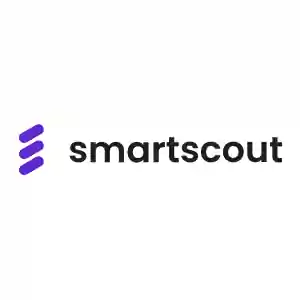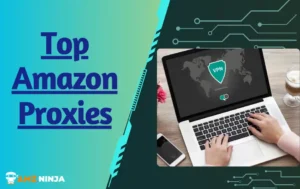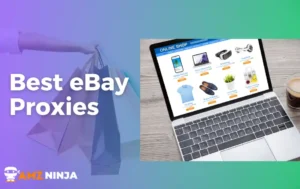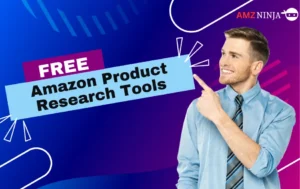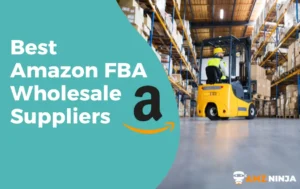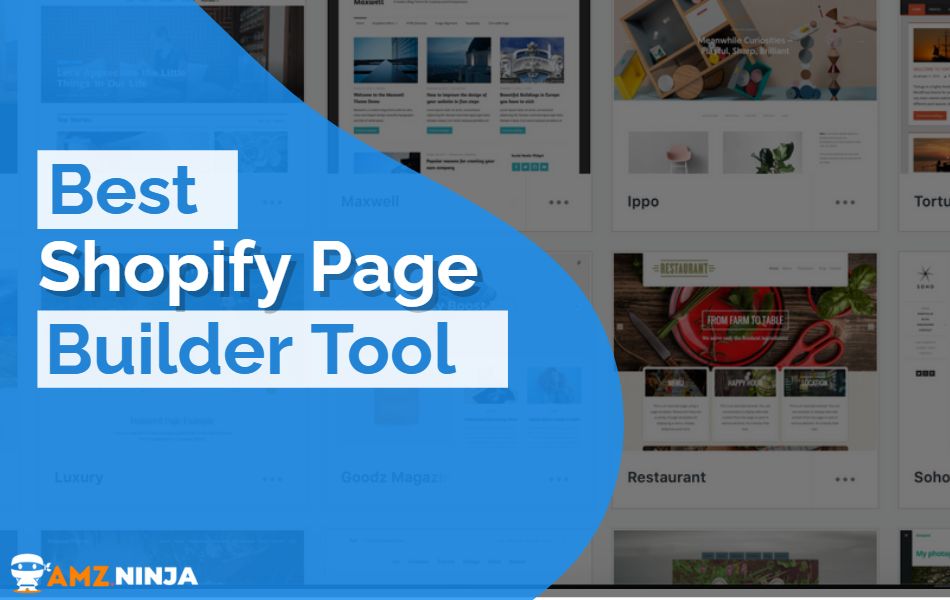
Are you a Shopify store owner looking to take your online presence to the next level? Guess what? You just stumbled upon some of the Best Shopify Page Builders.
Having a visually appealing and user-friendly website is pretty important for attracting and retaining customers. While Shopify provides a solid foundation, its default themes and templates can sometimes feel limiting. And this is where Shopify Page Builders come into the scenario.
From drag-and-drop interfaces to pre-designed templates and advanced features, these page builders offer a lot.
Let's check out some of the best in the game Shopify Page Builders!
Why Use Shopify Page Builders?
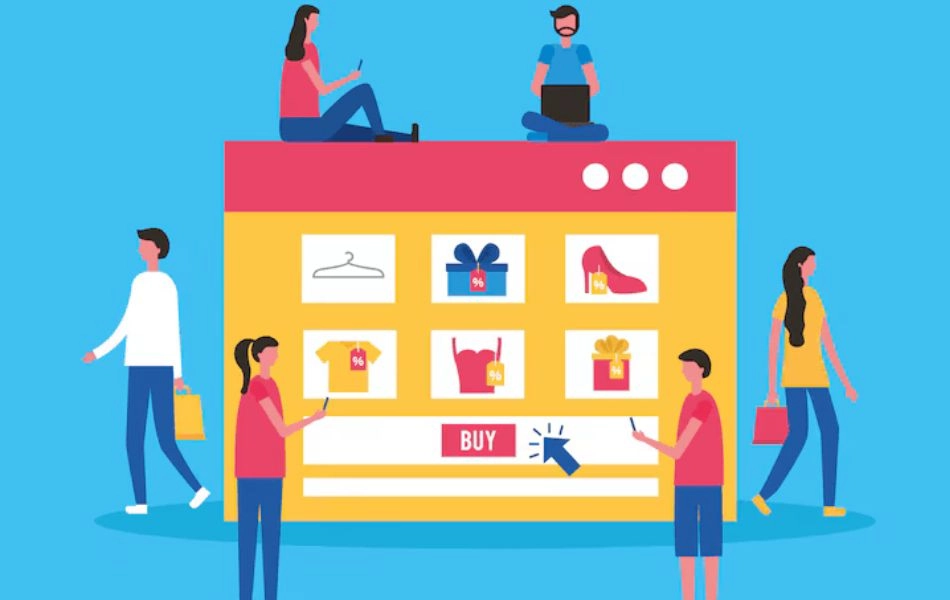
Shopify page builders offer several compelling benefits for online merchants. They provide an intuitive drag-and-drop interface that allows you to create visually stunning pages without any coding knowledge. This ease of use saves you significant time and money compared to hiring a developer.
Page builders also ensure your pages are mobile-responsive and optimized for conversions with built-in features like calls-to-action and product showcases. Many page builders integrate seamlessly with Shopify's analytics, payment gateways, and other apps for a cohesive experience.
Best Shopify Page Builders 2026
| Page Builders | Standalone Features |
|---|---|
| Shogun | Drag-and-drop page builder with AI content generation. |
| PageFly | Free plan with responsive design and SEO optimization. |
| GemPages | Unlimited pages for just $59/month. |
| Zipify Pages | Built for high conversions with A/B testing. |
| Hypervisual | Headless solution for ultimate customization. |
| Buildify | Multilingual support for global brands. |
| LayoutHub | Expert help to maximize conversions. |
| EComposer | Speedy with lazy loading and image optimization. |
| Replo | Extensive template library, easy to use. |
| Bloggle | Blogging platform, SEO tools, social sharing, email subscriptions |
1. Shogun
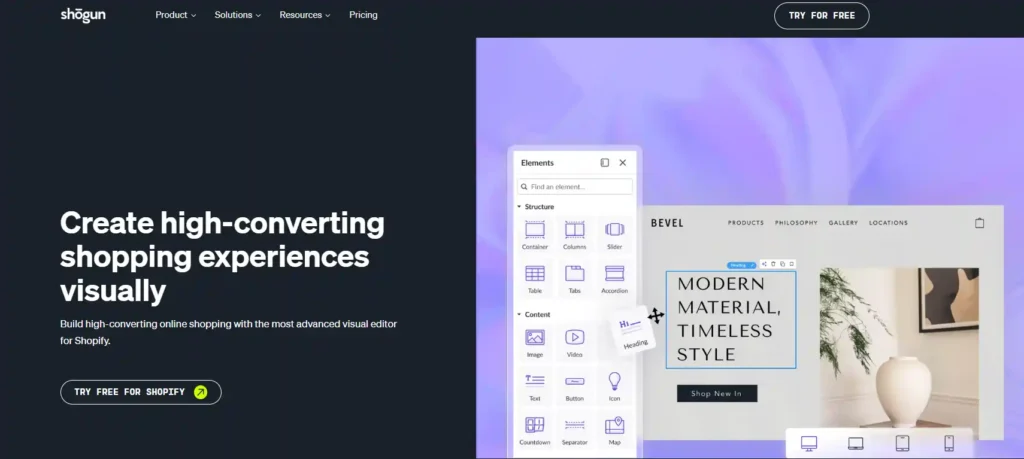
Shogun is a powerful drag-and-drop page builder that allows Shopify merchants to create visually stunning pages without any coding knowledge. It offers a wide range of customizable templates, elements like forms and product reviews, and advanced features like A/B testing and content scheduling.
Shogun ensures your pages are mobile-responsive, SEO-optimized, and integrated with Shopify's analytics for a seamless experience. With its intuitive interface and a complete toolset, Shogun allows you to design high-converting, on-brand shopping experiences that elevate your online store.
Shogun Key Features
Pros and Cons
Pros
Cons
Shogun Pricing
Shogun's pricing starts at $39/month for the Build plan which includes 25 published pages. The more advanced Grow plan is $199/month for unlimited pages, SEO tools, content scheduling, and more. The top-tier Advanced plan costs $399/month and adds multi-store content syncing.
2. PageFly
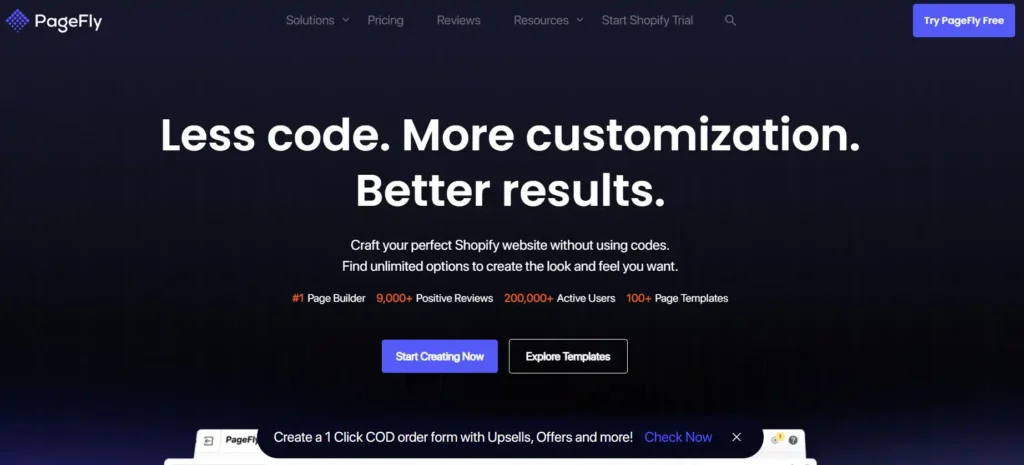
PageFly is a powerful and user-friendly Shopify page builder that allows you to create stunning, conversion-optimized pages for your online store. With its intuitive drag-and-drop interface, you can effortlessly customize every aspect of your pages, from layout to design elements, without any coding knowledge. PageFly offers a library of pre-built templates and elements, making it easy to create professional-looking pages that align with your brand.
PageFly Key Features
Pros and Cons
Pros
Cons
PageFly Pricing
PageFly keeps things simple with a free plan to get started and paid monthly plans based on how many pages you need – $24 for up to 5 pages, $49 for 20 pages, all the way up to $99 for unlimited pages, and priority support.
3. GemPages
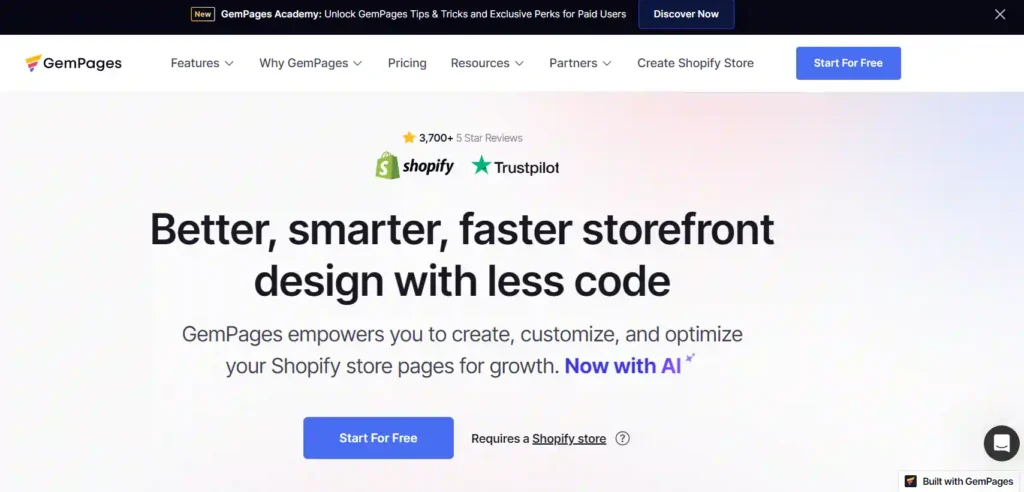
GemPages is a powerful drag-and-drop page builder that empowers Shopify merchants to create visually stunning and high-converting pages without any coding knowledge. With its intuitive editor, extensive library of templates and elements, and AI-powered features like Image-to-Layout, GemPages streamlines the process of designing responsive and on-brand pages for various purposes, including landing pages, product pages, homepages, and blogs.
GemPages integration with Shopify and third-party apps, along with robust marketing tools like countdown timers and pop-ups, make GemPages a comprehensive solution for boosting conversions and driving business growth.
GemPages Key Features
Pros and Cons
Pros
Cons
GemPages Pricing
GemPages keeps things simple with 4 clear pricing tiers – a free plan to get started, plus 3 paid monthly plans (Build $29, Optimize $59, Enterprise $199). The free plan is great for dipping your toes in, while the paid plans unlock premium features like unlimited pages, priority support, and more advanced tools to really level up your Shopify store's design and conversions. Annual billing also saves you 20% compared to monthly.
4. Zipify Pages
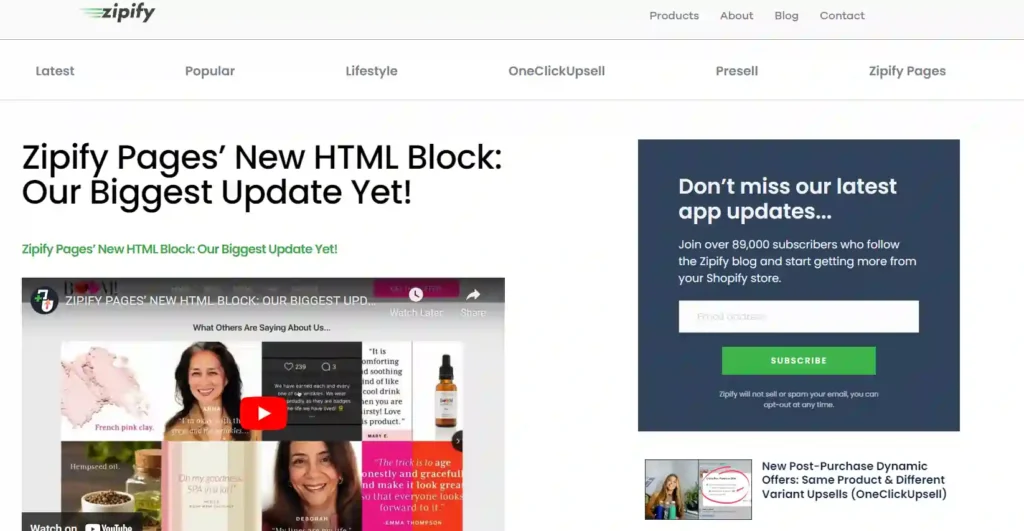
Zipify Pages is a dynamic landing page and sales funnel builder designed exclusively for Shopify stores. It offers a drag-and-drop interface, enabling merchants to create high-converting pages without needing coding skills.
With features like AI Copy Generator, mobile responsiveness, and direct-response templates tested on a 9-figure store, Zipify Pages simplifies the creation of product pages, blogs, and more. It also supports A/B testing and integrates with major marketing tools, making it a comprehensive solution for enhancing online store performance.
Zipify Pages Key Features
Pros and Cons
Pros
Cons
Zipify Pricing
Zipify Pages has a free 14-day trial. Paid plans start at $29/month for the Basic plan. They also offer a $59/month Advanced plan and custom pricing for enterprises.
5. Hypervisual
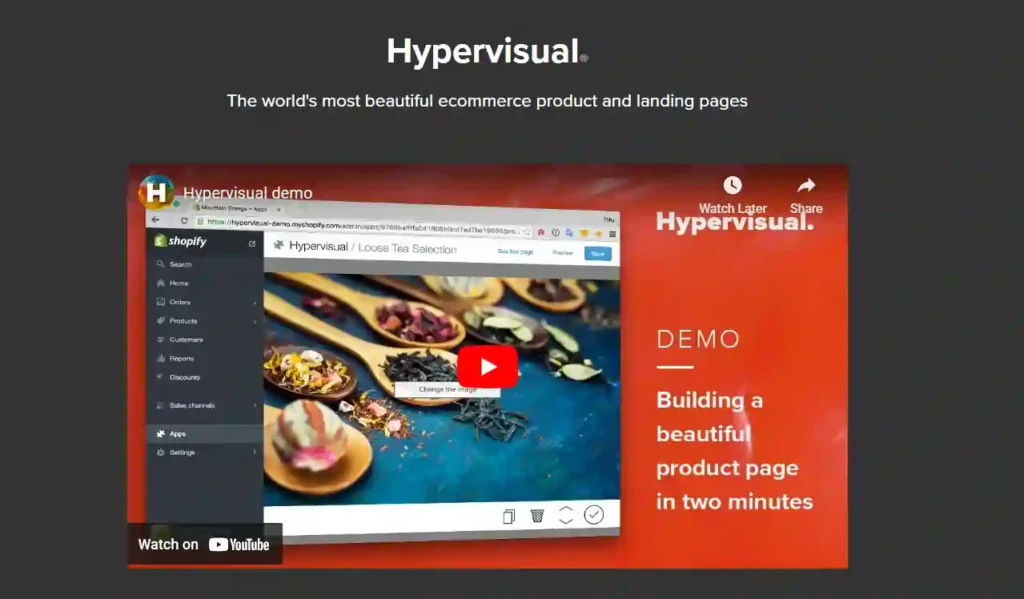
Hypervisual is a comprehensive page builder for Shopify, enabling merchants to create custom-designed landing and product pages without coding. It enhances conversion rates through features like add-to-cart forms and embedded collections. Optimized for speed and SEO, Hypervisual ensures content is mobile-responsive and search-engine friendly. It's praised for its user-friendly interface, performance, and seamless integration with platforms like Klaviyo and Shopify.
Hypervisual Key Features
Pros and Cons
Pros
Cons
Hypervisual Pricing
Hypervisual keeps pricing simple with three straightforward plans – Merchant at $9.95/month for up to 25 pages, Pro at $24/month for 75 pages, and Ultimate at $49/month for unlimited pages. All plans include unlimited revisions and access to their top-notch support.
6. Buildify
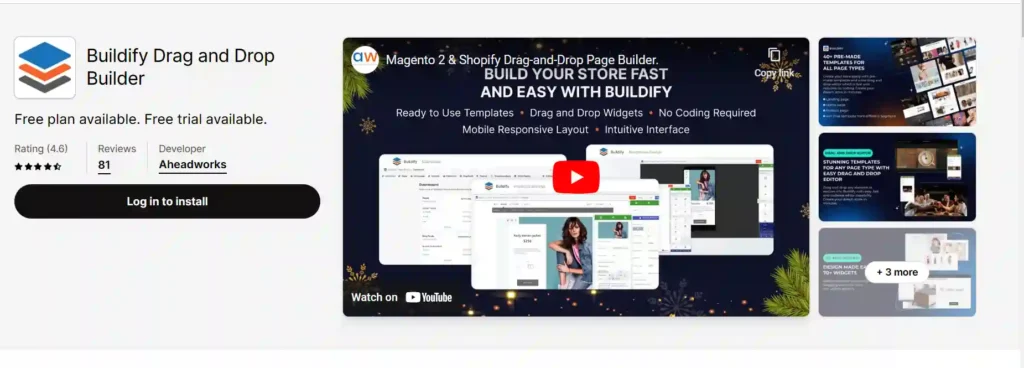
Buildify is a versatile drag-and-drop page builder for Shopify, designed to enhance the functionality and aesthetics of e-commerce sites. It allows users to create stunning landing, product, and blog pages effortlessly, with a wide array of templates and widgets. Buildify's user-friendly interface ensures a seamless design experience without the need for coding skills. It supports responsive design across devices, making it accessible to a broad audience. The tool also offers analytics integration to track user engagement and optimize page performance.
Key Features
Pros and Cons
Pros
Cons
Buildify Pricing
Buildify has a free plan that allows 3 published pages. Paid plans start at $9.99/month for up to 15 pages, going up to $29.99/month for unlimited pages and premium support.
7. LayoutHub
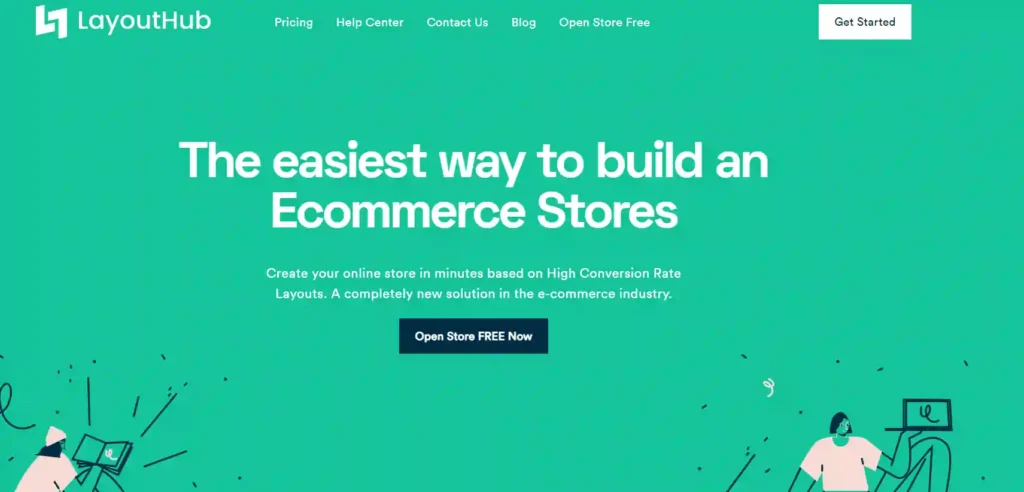
LayoutHub is a user-friendly page builder that serves specifically to smaller businesses and Shopify newbies. With its intuitive interface and pre-built templates, you can effortlessly create a professional-looking store without any coding knowledge. While the customization options are more limited compared to powerhouses like PageFly, LayoutHub shines in its simplicity.
The app seamlessly integrates with your Shopify dashboard, providing a range of templates to help you hit the ground running. And with its reasonably priced plans, LayoutHub offers a cost-effective solution for those seeking a hassle-free way to elevate their online presence.
LayoutHub Key Features
Pros and Cons
Pros
Cons
LayoutHub Pricing
LayoutHub keeps things simple with 4 pricing tiers – a free plan, plus Basic ($14.99/month), Pro ($29.99/month), and Premium ($59.99/month) paid options. The higher plans unlock more pages, autosaves, live chat support, and the lazy loading feature.
8. EComposer
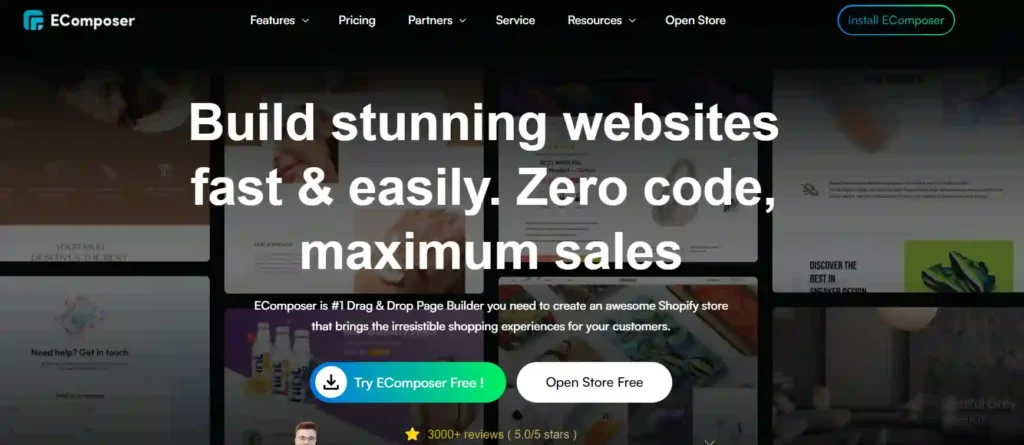
EComposer is a leading drag-and-drop page builder for Shopify, enabling merchants to create professional, high-converting websites without any coding skills. It offers over 300 templates and 100+ design elements, making it versatile for any page type, from landing pages to product pages. EComposer goes beyond just aesthetics, offering a suite of built-in sales-boosting features like Ajax Cart, Colour Swatches, and Cross-Selling capabilities.
Launched in 2022, EComposer is praised for its ease of use, Shopify-standard integration, and robust features like AI Content Generator and Page Analytics. It also provides 24/7 live chat support, ensuring assistance is always available.
EComposer Key Features
Pros and Cons
Pros
Cons
EComposer Pricing
EComposer offers a free forever plan to get started, as well as three paid tiers – Standard ($19/month), Pro ($39/month) and Premium ($99/month). The paid plans unlock more published pages, saved templates, premium features like the AI content writer, global blocks, priority support, and more. Annual billing provides a 17% discount.
9. Replo
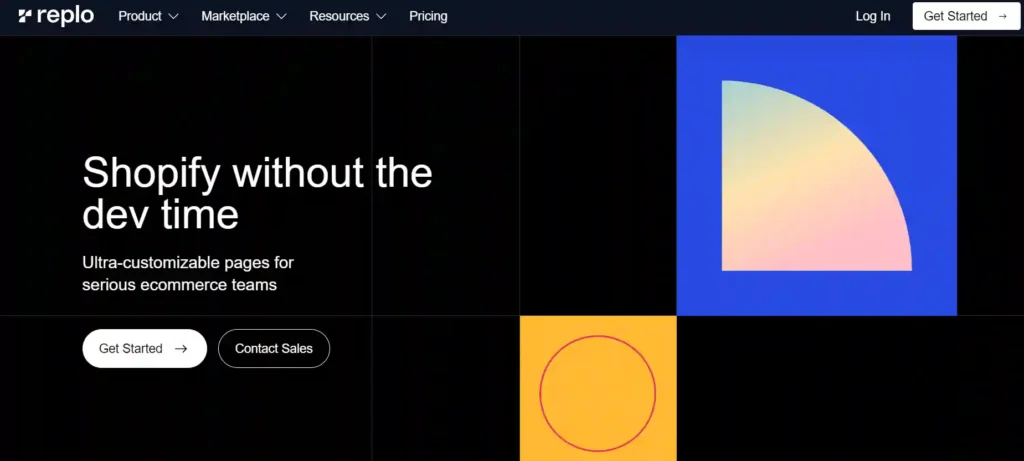
Replo is a powerful no-code platform that empowers ecommerce businesses to create highly customized and visually stunning landing pages for their Shopify stores. With its intuitive drag-and-drop interface and extensive library of pre-built templates, Replo streamlines the process of designing and launching high-converting landing pages without the need for coding expertise.
By seamlessly integrating with Shopify, Replo enables merchants to leverage their existing product data and analytics, ensuring a cohesive and data-driven approach to optimizing their online presence.
Replo Key Features
Pros and Cons
Pros
Cons
Replo Pricing
Replo has a freemium pricing model with a free plan that allows unlimited page previews. Paid plans start at $99/month for the Basic plan, with more advanced Standard ($199/month), Growth ($399/month), and Enterprise offerings for larger businesses needing custom solutions and priority support.
10. Bloggle
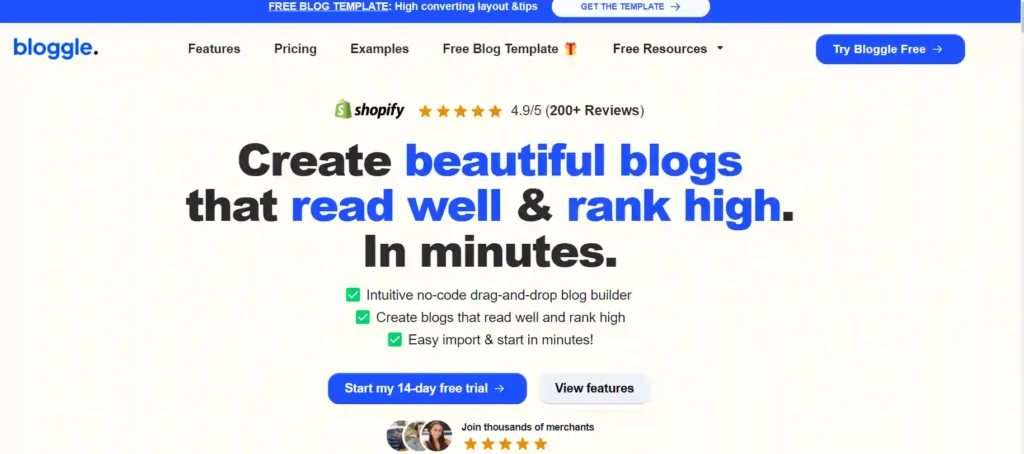
Boggle is a powerful and user-friendly blog builder app designed for Shopify stores. With its intuitive drag-and-drop editor, Boggle enables merchants to create visually appealing and engaging blog pages in minutes. The app offers a wide range of customizable templates, making it easy for users to design unique and professional-looking blogs that align with their brand identity.
Additionally, Boggle provides easy SEO management, offering suggestions for every article to help improve search engine rankings and generate more organic revenue. With Boggle, Shopify merchants can seamlessly add products to articles, enhancing the shopping experience for their customers.
Boogle Key Features
Pros and Cons
Pros
Cons
Bloggle Pricing
Bloggle offers a Standard plan at $25/month and a Premium plan at $49/month with extra features like unlimited templates, Klaviyo integration, and priority support. They provide a 10-day free trial to test it out.
How to Choose the Right Shopify Page Builder?
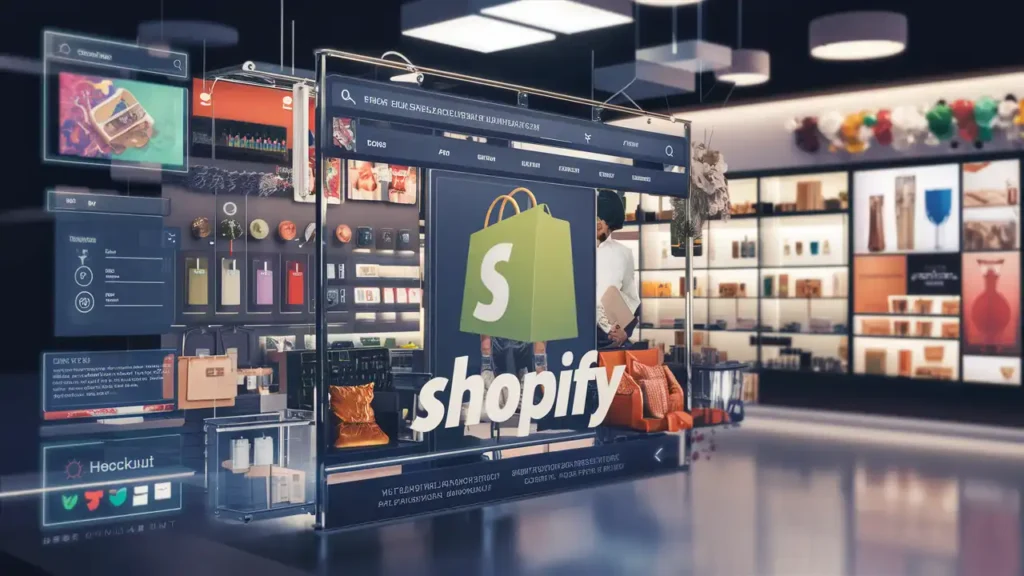
Picking the perfect Shopify page builder is crucial for your store's success, but with so many options, where do you start?
First, get clear on your needs – are you a design whiz looking for tons of creative freedom? Or maybe you just want something simple and user-friendly.
Next, consider your budget and what features are must-haves versus nice-to-haves. Don't forget to factor in things like templates, support, and third-party integrations too.
My advice? Try out a few different builders first.
Most offer free trials or limited free plans so you can get a feel for the interface and see if it's a good fit.
Got Questions on Shopify Page Builders?
Can Shopify Page Builders Integrate with Third-party Apps?
Do Page Builders Affect Site Speed and Performance?
How do Page Builders handle Mobile Responsiveness?
Can I Use Custom Code with a Shopify Page Builder?
Are Page Builder templates SEO-friendly?
Can I Migrate an Existing Store to a Page Builder?
Do Page Builders Work with all Shopify Themes?
How do Updates affect Customizations made with builders?
Can Multiple Team Members Collaborate on Page Building?
Are there any Limitations on the Number of Pages/Products?
You may also read:
- Best WordPress Themes for Amazon Affiliates
- ChatGPT Prompts for Amazon Sellers
- How to Get the Everbee Free Trial
- Best Perpetua Alternatives
The Curtain Call
There you have it, folks! We've covered some of the top page builders that can help you craft a stunning Shopify store without coding expertise.
Selecting the right Shopify page builder can significantly enhance your online store's appearance, functionality, and overall user experience. With a wide range of options available, it's essential to consider factors such as ease of use, customization capabilities, and integration with other apps.
Whether you want advanced design capabilities, an intuitive drag-and-drop interface, or a budget-friendly option, there's something for everyone.
The ball is in your court now. Which page builder caught your eye? Or do you have a different favorite that you swear by? Share your thoughts in the comments below!


